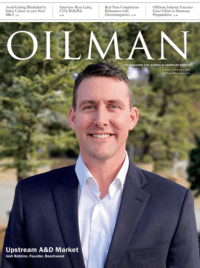Alan Alexeyev: Tell us a little bit about your current (or latest) position and what you do, as well as how you found a job.
Ahmed Elgohary: I currently work as a QHSE engineer. I started out as a rig hand then I became an operations engineer with a drilling contractor. When the slow down happened, I was transferred to QHSE where they felt there was a need for an engineering team to revamp the organization’s safety system.
AA: What inspired you to start a career in the oil and gas industry? How did you decide to become a petroleum engineer?
AE: I grew up in the Middle East where politics is part of everyone’s life. The oil field is affiliated with politics, which is what inspired me to become part of the game. I did not really know much about the content studies in petroleum engineering; however, I was one of the top students in high school in Egypt, which made me eligible to enroll in petroleum engineering faculty in Suez Canal, as it is very selective since they only accept a handful of students from the entire country.
AA: You often meet workers in industry who do not have a formal college degree but, in your case, how valuable was it to get the university experience?
AE: The way I see it, and excuse my expression, having a university degree (preferably engineering) and going to work in the industry is like going to war while having a more advanced weapon to fight with. You are still going to fight, and you might actually not win the fight, but it gives you some leverage of winning the fight. In other words, it is a good idea to have a petroleum engineering degree, but it is not a guarantee you’ll make it to the top. As we all know, most organizations care about hiring someone who can have a positive contribution to their business. This is when soft skills and oil field experience come into play, and these are not acquired through college.
AA: How did you find yourself transitioning from an academic environment to the industry/corporate? What would you tell people who are about to make such a transition?
AE: It was a very tough transition going from a petroleum engineering graduate working as a rig hand. You have to turn on survival mode if you’re put in such a situation; otherwise, you won’t make it. The situation is different from person-to-person, but my advice is to try to make connections with industry personnel and get industry internships while in college as this would increase your chances of landing a nice job after graduation and, believe me, this is [far] more important than your GPA. The industry/corporate environment is a totally different game that relies heavily on being a people person and maintaining good relationships and, above all, being a leader.
AA: Has the industry taken initiatives to help smooth the transition for young professionals into the oil sector? What, if anything, could be done better?
AE: Unfortunately, in my opinion, no. And it’s not in the large corporations’ favor to do so. If you look at the big corporations’ attrition profile, you’ll notice they have relatively high attrition. The reason is because joining a big corporation is like going to the military. In an organization, some will survive; some won’t, and they will quit. The nice part here for the organization is that the ones who survive are the good soldiers and they’re now in the system and part of a long-term process to become future leaders. This brings us to one of the main aspects of a leader which is to be adaptable (in industry terms, to be moldable). Now, if this transition was so smooth, everyone would make it, including individuals who are not willing to do what it takes (and in the eyes of an organization, they’re not leaders).
AA: The oil and gas industry has tons of conferences and events. Have you attended any of them? If so, how useful do you find them and what’s your takeaway?
AE: Yes, I used to attend a lot of them, with the mentality of trying to get a job, and this was the issue. If I go back in time, I would change my mentality from trying to land a job to trying to make good friends, and I mean it; you’re really trying to make a friend, like you would in college. You meet someone that you feel you have a lot in common with – maybe at the conference or the hotel or the bars afterwards – and you make friends with them and stay in touch with them. Through pure friendship, this person may be the reason you were able to find a job after graduation. If not, you still have a good friend and a good connection.
AA: If you communicate with students on a regular basis, do you think there’s an increased or decreased interest among young [people] to have a career in the oil and gas industry, in comparison to the past?
AE: I would say, in general, there’s decreased interest; however, unfortunately a very slight decrease, since most of the students are not really in tune with the industry or trying to predict if it [will survive] or not. Picking a major nowadays is like picking a watermelon – you never know what’s inside it until you open it. My advice to young [people] is do in-depth research before joining a major and, above all, taking advice from people who have been in this specific industry for years. Also, follow your passion.
AA: What advice do you give to students who have an interest in the oil and gas industry? Should they pursue the career during these constant downturns?
AE: I would love to tell them, yes, go for it if it’s your passion, but my opinion has changed recently. I literally just convinced one of my best friends, who was enrolled in petroleum engineering, to switch their major because of the many downturns and the feeling of instability. The only reason I would tell someone to continue pursuing their oil and gas career, if they still have not finished college, is if they really know someone or have a strong connection with oil and gas industry higher ups. It’s the ugly truth. It is all about who you know not what you know, fellas!
AA: What main technical skills do you think will be needed for the industry in the near term based on your experience so far?
AE: As I mentioned earlier, soft skills and field/industry experience are more important. When it comes to technical skills, however, I advise taking technical courses or participating in organizations to improve your leadership or management skills. You could even enroll in a minor in college that would improve these skills. Depending on your interests, seek international technical certified courses related to what you’re trying to do after graduation, which is something you MUST decide during college. You can’t just say, for example, “I want to become a petroleum engineer,” as this is so broad. You have to be specific and work toward your focused goal. For instance, you’re very interested in the drilling side, so you take well control, and stuck pipe prevention courses through the IADC, or maybe look for a drilling simulator course/internship, preferably outside of college.
AA: What would you like to learn in the near future from experienced people who are in their mid-to-late careers?
AE: I am an observer, so I like to make conclusions myself instead of asking leaders how they made it this far. There is a reason why an organization decided to put someone in a higher up position, like a vice president, for example. If you ask them about their advice, they’ll give you a general answer like, develop your skills and increase your exposure with different departments/segments within the company, or maybe even sign up for global assignments, or take the company’s offered training courses and so on. Ask yourself, “Didn’t everyone else around do the same thing?” so why specifically did this person become the leader? You have to make the conclusion yourself and you have to be a very observant person. When you reach this high a position within an organization, the very small details matter, like your body language, how you look, how you talk – everything matters – and if you want to be this person in the future, you have to start learning the little details/secrets they did not tell you about when you asked their advice. alan
Alan is a graduate from the University of North Dakota with a Master's degree in Petroleum Engineering. He previously earned his BA in Mathematics from the University of Houston and a BS in Petroleum Engineering from the University of Wyoming. Alan is an active SPE member and has presented at petroleum conferences and exhibitions.






